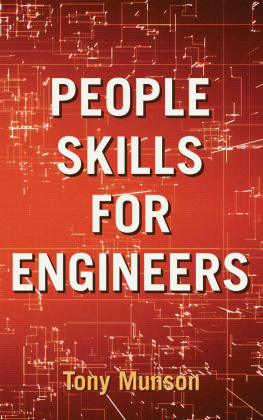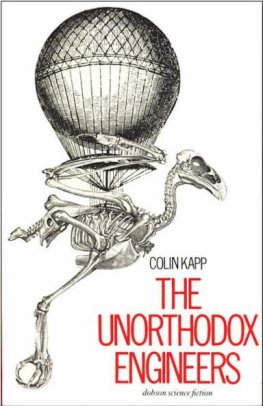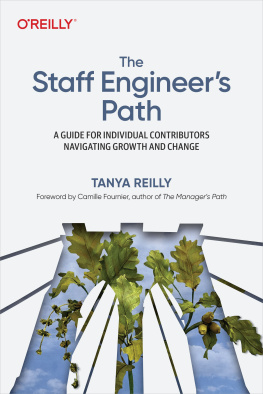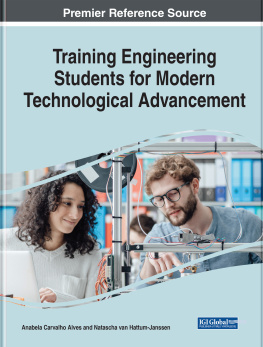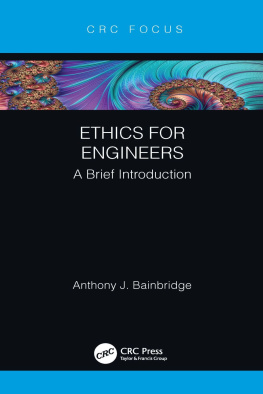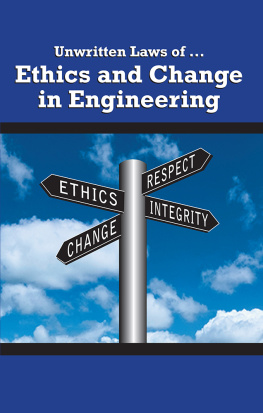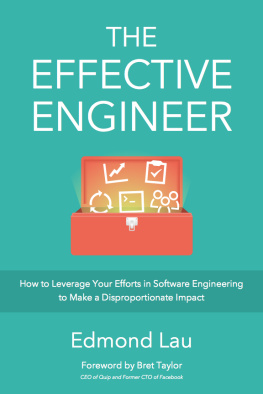
Copyright 2018 by Tony Munson
All rights reserved.Written permission must be secured from the author to use or reproduce any part of this book, except for brief quotations in critical reviews or articles.
The author may be contacted through his website at
www.peopleskillsforengineers.com.
ISBN: 9781723996788
To all the engineers who want to be more skillful with people, but dont know where to start, this book is for you.
Contents
H ave you ever had the feeling that you were doing something wrong, but couldnt quite put your finger on what? This is exactly how I used to feel as I tried to figure out why some personal interactions didnt turn out like I thought they should or why there seemed to be bad blood between myself and certain individuals for no obvious reason.To make matters worse, I had no idea how to go about fixing these problems once I thought I understood where I went wrong. In short, things seemed too dang hard, and I wanted to know why this was the case.
As I began to investigate the topic of people skills, it quickly became apparent to me that I had stumbled upon one of the foundational skill sets to living a happier, healthier, and more successful life. And this is coming from a technical guy. Initially, I was a little angry. I wondered: Where had this information been all my life? Why was this the first time I was seeing it? Turns out, I wasnt the only one who missed the memo on people skills.
As I began to grow, I immediately noticed that my fellow engineers could be better positioned for success if they learned the same thing I was learning: how to properly interact with others. More specifically, how they could avoid and resolve conflicts, deal with offensive individuals, build stronger relationships to increase opportunities, and have a healthier influence over others, just to name a few.
Most high schools and colleges dont teach engineers what they need to know in this area, consequently, many of us are grossly unprepared to deal with the people problems we inevitably have to face not only on the job, but after we clock out for the day and go home. Because we arent being taught these skills as part of our core engineering curriculum, some may assume they will come naturally. People skills are not typically innate in many engineers, so we are forced to take personal responsibility for our own development by proactively seeking out the training we need.This is where I come in.
Thats great, but who the @#$% are you? you ask. Im one of youa software engineer. I hold a bachelor of science in computer science and have more than sixteen years of software engineering experience under my belt. Ive worked in large and small research and development (R&D) groups. I write design documentation, submit code for review, and work on features, defects, and customer escalations. I attend daily stand-ups, weekly staff meetings, and have one-on-ones with my manager. During my career, I have helped develop custom Application-Specific Integrated Circuits (ASICs) with computer engineers and developed Linux drivers in C. I have developed infrastructure in .NET, designed mobile applications in Java and Objective-C, and implemented back-end server logic in Python. Ive spent my entire career working with electrical engineers, computer engineers, mechanical engineers, and computer scientists, so I know exactly what its like to grind it out year after year in a cube, working with difficult people.
Many engineers believe that the only thing that really matters is their ability to solve technical problems. Because of this, engineers can be socially lazy and may fail to understand how much their underdeveloped people skills costs them in lost opportunities (i.e., promotions, jobs, and work assignments), reduced efficiency, increased stress, and ultimately, their happiness.This ignorance keeps them blind to pursuing growth in this area.Additionally, many engineers have no idea what being good with people looks like in practice.With so few role models, its the proverbial blind leading the blind in many work environments.
Successfully dealing with people is a skill set that engineers can develop over time and with use, but it can be tempting to give up when things get challenging. Its not uncommon for engineers to stop trying to improve in this area and withdraw into themselves, relying on hope and luck when it comes to interpersonal interactions.This is not a formula for success any more than relying on hope and luck when implementing your next technical deliverable.
Learning the correct way to do things can save a ton of frustration and anguish. As an engineer, you are a person first and an engineer second. Focusing on being a strong engineer before focusing on being a mature person is akin to putting the cart before the horseyoure getting things out of order. Your people skills, or lack thereof, bleed into every relationship and every interaction you have. If you have gaps in your core set of skills, you could potentially have serious problems. If you build your career on a strong foundation, many problems will never materialize.You will have avoided them completely.
People are very predictable.When we do things that are known to cause problems, there should be no surprise whatsoever when thats exactly what we get in returnmore problems.We can learn where the land mines are and avoid them.
Engineers need help. With my background, I realized I could be the one to step in and fill the gap in this often neglected but critically important space. I want to give my fellow engineers more tools to use, so they can stop struggling with the same frustrating problems year after year. These problems include but are not limited to:
Feeling isolated and disconnected from others.
Problems with management or co-workers.
Poor performance at interviews or meetings.
Interaction regret or wishing they would have behaved differently in personal interactions.
Inability to properly lead and motivate others.
What you are holding in your hands is the result of literally hundreds of hours of reading, teaching, mentoring, studying, and hands-on application. I spent years doing a deep dive into this type of material, so you dont have to. I distilled a lot of information down to pill-size form, keeping only what I considered the best parts. Each chapter and section was specifically selected because of the usefulness of the principles it contains. Every attempt was made to remove filler.
Im a results kind of guy. If something isnt helping me, at best its doing nothing for me, which means it needs to be evaluated.At worst, its hurting me, and in that case, it needs to go. I not only found all the concepts in this book to be helpful from a personal standpoint, but also from a teaching perspectivethey are changing peoples lives.There is no theory here. Everything Im going to tell you, I do myself.To the best of my ability, I tried to keep the material actionable and to the point.
There are reoccurring themes and scenarios that we all must deal with while working alongside other engineers and engineering managers.What Ive put together is a resource that outlines the minimum core set of people skills every engineer needs to know to survive and thrive in the workplace.Why make people learn the hard way, through repeated failures, when their careers are on the line? If youre anything like me, youd rather learn from someone elses mistakes rather than make the same mistakes yourself and potentially sabotage important opportunities along the way. My intent is that an engineer accepting a position at a company would be given this book and told:Read this. It will save you a lot of personal agony and grief.
Next page
